Dogecoin Is Real -- And They Party With Dogs
by Dan Glaun
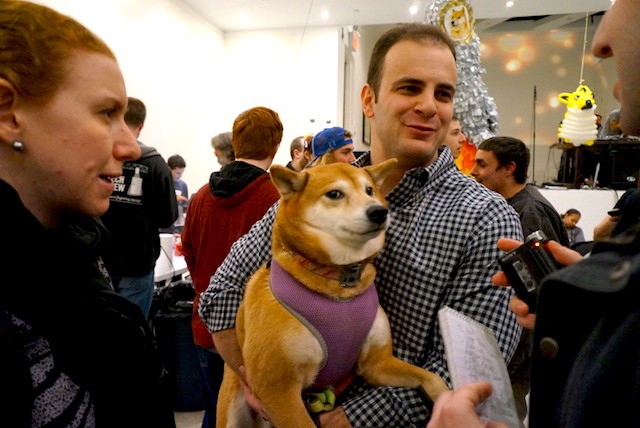
At first glance, Friday night’s meetup at the Bitcoin Center’s downtown offices could have passed for any other start-up party. The crowd skewed young, many in hoodies and looking barely grown out of their Chuck Taylors, but mixed in were members of the blazer-and-blue-jeans set and even a select few people above the age of 35. Most, clustered in groups beneath the Center’s green-lit high ceilings, stayed largely indifferent to the DJ spinning dance tracks.
But there were some things that were odd. First, there was no booze, due to the small but vocal contingent of grade school kids in attendance. Second, there were the dogs. Also, the people dressed as dogs.
It was the first Dogeparty — an event for fans of Dogecoin, a digital currency themed around the ubiquitous Shiba Inu meme and which, at current exchange rates, has a market capitalization of over $50 million.
Doge may be a joke, but Dogecoin is very real. It’s a friendly parody of Bitcoin, the pioneering digital currency that was valued at $25 a year ago, $848 a month ago, $808 a week ago and $663 today. Both currencies — and the dozens of other digital monies that have been created in recent months — rely on an innovation in cryptography called block chain technology that allows online transactions to be verified without a middleman, essentially cutting out the banks or payment services that have traditionally made sure online money goes where it’s supposed to.
Where Bitcoin has a community that often treats digital currencies as a libertarian political movement to supplant government-backed money, Dogecoin’s users embrace their investment’s jokey origins. Dogecoin’s Reddit forum is filled with users ‘tipping’ each other comically large sums — 1,000 Dogecoins are currently worth about $1.20 — for little to no reason, raising funds for charity and writing in the doge meme’s signature sentence fragments. Tied into the lure of what users call cryptocurrencies are the communities that accompany them in tech-friendly forums like Reddit.
Among the first to arrive at the party was Travis Gehret, an early adopter of Dogecoin when it launched almost exactly two months ago, on December 8, 2013. It was the community’s friendly and relentlessly upbeat atmosphere, worlds away from Bitcoin’s Ayn Rand-meets-Alan Turing self-seriousness, that attracted Gehret to Dogecoin. Gehret, an IT professional who now runs an online registry of businesses that accept Dogecoin, contributed to the Dogecoin fundraising drive for the Jamaican bobsled team’s trip to the Sochi Olympics — an effort that raised the equivalent of $30,000 (and also won the currency worldwide press coverage and introduced a generation of young techies to Cool Runnings.)
“I’ve always known about Bitcoins and I wasn’t an early adopter of them, and when I heard about the Dogecoins I just thought it was hilarious,” Gehret said. “I love the doge meme and I joined the community on Reddit. Everyone’s so friendly — it’s really about community.”
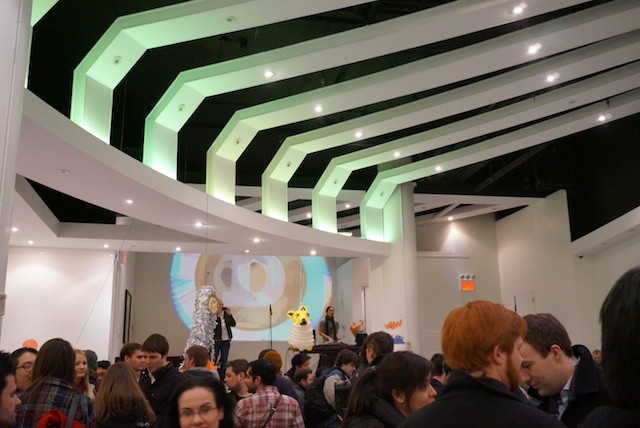
As with Bitcoin, Dogecoin’s ‘miners’ are rewarded with coins when their computer systems run scripts to solve complex mathematical problems. Those coins can then be stored in digital wallets and traded on online exchanges, or spent at the growing number of business that accept them (and who generally convert them straight back into dollars, to avoid the wide swings in value typical of these markets).
That’s the short version of Dogecoin’s technical backbone. But it’s the currency’s memetic skin that has granted Dogecoin unprecedented growth and amused attention from both investors and mainstream media. (Its market capitalization has blown up from about $3.5 million following its introduction nine weeks ago to about $51 million today, and the Dogecoin Reddit forum now has 57,000 subscribers.) The coin’s mascot is a manipulated photo of a Shiba Inu.
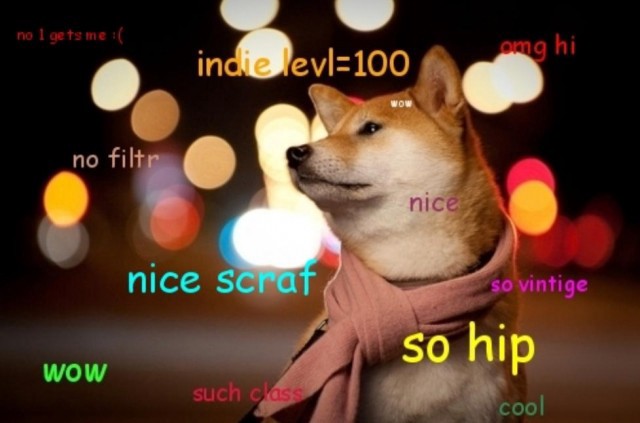
Doge itself is a remarkably popular internet joke with a longer-than-usual shelf life. The format is simple. Doge’s Shiba Inu is a canine ingenue in a constant state of awe at his or her situation, who expresses herself in subliterate sentence fragments. It’s a versatile premise. Should one wish to comment on the issues of the day, doge is willing and able. Cut and paste her face onto the George Washington bridge; “Such traffic,” the shibe might say, “Wow. Very Christie. Many scandal.” Instant, social-media-ready wit — easily recognizable and accessible to anyone with basic knowledge of Photoshop.
Ben Doernberg, an organizer of Friday’s meetup and the MC of the night’s high-stakes dance battle — more on that later — considers Dogecoin greater than just a parody or an investment opportunity. Doernberg is a Dogecoin evangelist who comes across more as a well-meaning think tank fellow than megachurch pastor, with a theoretical yet earnest bent befitting his Wesleyan sociology degree. For him, the currency is an initial step of a broader social project — one that, given its jokey origins, has serious aspirations for how people connect and do business over the internet.
“The most important thing about it is that the community behind it is all about the joy of life and generosity and excitement,” Doernberg said Thursday in an interview. “When everything in our culture is so much about people being ironic or apathetic, it’s really powerful when people get behind something sincerely. I think it takes something as as goofy as doge to get people to let down their guard a little bit.”
Doernberg cited the positivity-first models of aggressively upbeat (if also aggressively capitalist) media groups like BuzzFeed and Upworthy as doge’s kindred spirits, but lest that set anyone’s smarm sensors blazing, he emphasized that the attitude was not an empty gesture. In addition to its well-publicized funding of the Jamaican and Indian Winter Olympic teams, the Dogecoin Subreddit has raised $30,000 for children’s service animals as well.
While Doernberg was quick to point out the community’s charitable efforts, it took longer for him to address the $50 million elephant in the room: That the currencies quick rise has drawn the attention of scammers and get-rich-quick traders. In its first month, hackers stole millions of coins from Dogewallet, an online coin storage service, wiping out some early investors.
Dogecoin’s community stepped in to raise funds for the hacking victims, Doernberg said, adding that the currency’s friendly culture was itself a bulwark against cynical scammers. “It’s something that’s viscerally unpleasant for people who aren’t in it for the right reasons,” he said.
Travis Gehret was one of those victims. He said at the party that he lost his first 1,300 Dogecoins in the attack, a setback that has not slowed his enthusiasm for the currency.
“There are people who really see a potential value for investment,” Gehret said. “I do as well. But I also see a potential to revolutionize currency in general, at least for the Internet.”
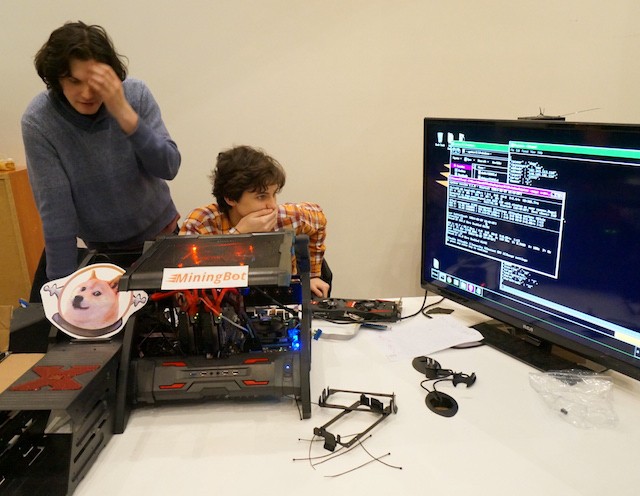
At the party, two shaggy-haired Dogecoin miners sat at a table, watching a computer with a red-lit cooling fan and its guts spilled out make scrip from scripts. Luke Wu of Manhattan Agriculture — a food consulting collective whose website describes its approach as “Fueling Performance & Evolution through a Meta-Modernist view of Ancient Sacred Healing” — was selling a viscous kombucha served in mason jars. Justin Stone Diaz, an Occupy Wall Street veteran, was dressed in what he termed a “vampire squid suit” to protest Goldman Sachs’ many financial tentacles.
There was a study in contrasts among the sellers at the trading table, an endearingly analog setup where Dogecoins could be bought and sold in person. Sandy Santra, an IT professional who said he had been unemployed for two years, was selling surplus Apple accessories at discount prices for “coffee money” and keeping hope that a rise in Dogecoin’s value could offset some of his financial struggles. Next to him a trader named Eric — he would only give his first name — was seeking to trade Bitcoins for about $10,000 worth of Dogecoins at what he described as a below market price. Eric said he worked in tech and finance and had begun trading cryptocurrencies in volume, meeting prospective buyers and sellers at coffee shops in the city to cement deals.
For investors I spoke to, the sheer amount of money at stake was not forgotten amid the memes and charity fundraising. Curtis Dunlap is an intern at the Bitcoin Center, which was co-founded by Nick Spanos in the ground-floor party space of 40 Broad Street and opened its doors on New Year’s Eve. (Spanos was a booster of John Catsimatidis for mayor and is now the CEO of a New York City real estate brokerage service.) Dunlap was outside smoking a cigarette and talking shop with a fellow enthusiast, and rolled the names of other infant cryptocurrencies off his tongue. The trick now is to guess which will explode and which will sputter. “It’s the wild west,” Dunlap said.
One of the party’s most popular guests was a different Sandy — a Shiba Inu, rescued from a Mid-Atlantic shore community following 2012’s hurricane and carted in for the evening by her adoptive owners from the Upper East Side. She and the several other Shibas were cooed over throughout the evening. Several attendees were decked out in their own doge costumes. These ranged in commitment from a pair of faux ears to a full yellow onesie, with one guest wearing an incongruous but well-received Chewbacca suit.
Hundreds of thousands of Dogecoins were won by costumed participants of an on-stage dance contest, set to an incessant Baha Men remix that could give anyone near-terminal bar mitzvah flashbacks. One lucky investor won the night’s million-Dogecoin raffle. (There was a catch: the winnings had to be spent on a charity project voted on by the audience.)
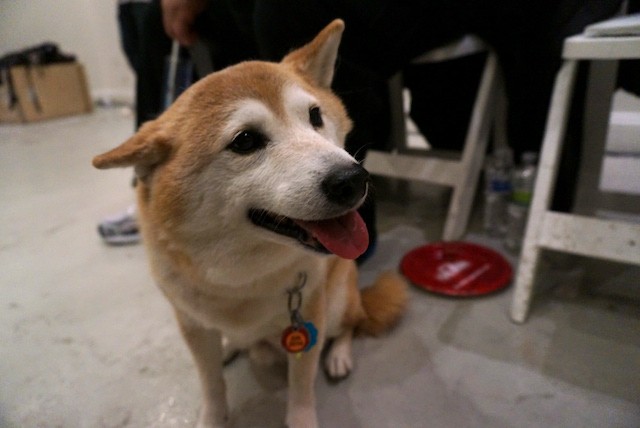
The party ended with a march to Charging Bull, the much-put-upon Wall Street statue. Upon arrival, the bull’s face was covered with a large papier-mâché Shiba Inu mask. The doge head didn’t cover the bull’s horns, giving the statue the aspect of one of the demon dogs from Ghostbusters, but that didn’t deter the Dogecoin fans who crowded around and took pictures. Two cops approached the gathering and warned against climbing over the barricades. The organizers hadn’t asked permission for the stunt, but the cops didn’t appear concerned. One said he’d seen much weirder things.
Dan Glaun lives in Queens and writes things with words. He can be reached at [email protected] or @dglaun on the Twitters. Photos are by Sherry Ng.
